![Featured image for “Diversity Atlas Newsletter [August 2022]”](https://diversityatlas.io/wp-content/uploads/2022/09/Untitled.png)
The nations behind the numbers: learning the language of data
August was a monumental month for Diversity Atlas! We reflect on the 2022 Equal Employment Opportunity Network’s Fourth Enabling Inclusion and Diversity Summit, discuss an article by our DEI Director covering eight simple DEI exercises, congratulate our business partner, Tali Nates, on receiving an esteemed award, reflect on our participation in the Centre for Cultural Diversity in Ageing virtual event as part of their Diversity Webinar Series and unpack new features to our website and platform, including upcoming events on our diversity calendar and the translation of our surveying platform into two new languages.
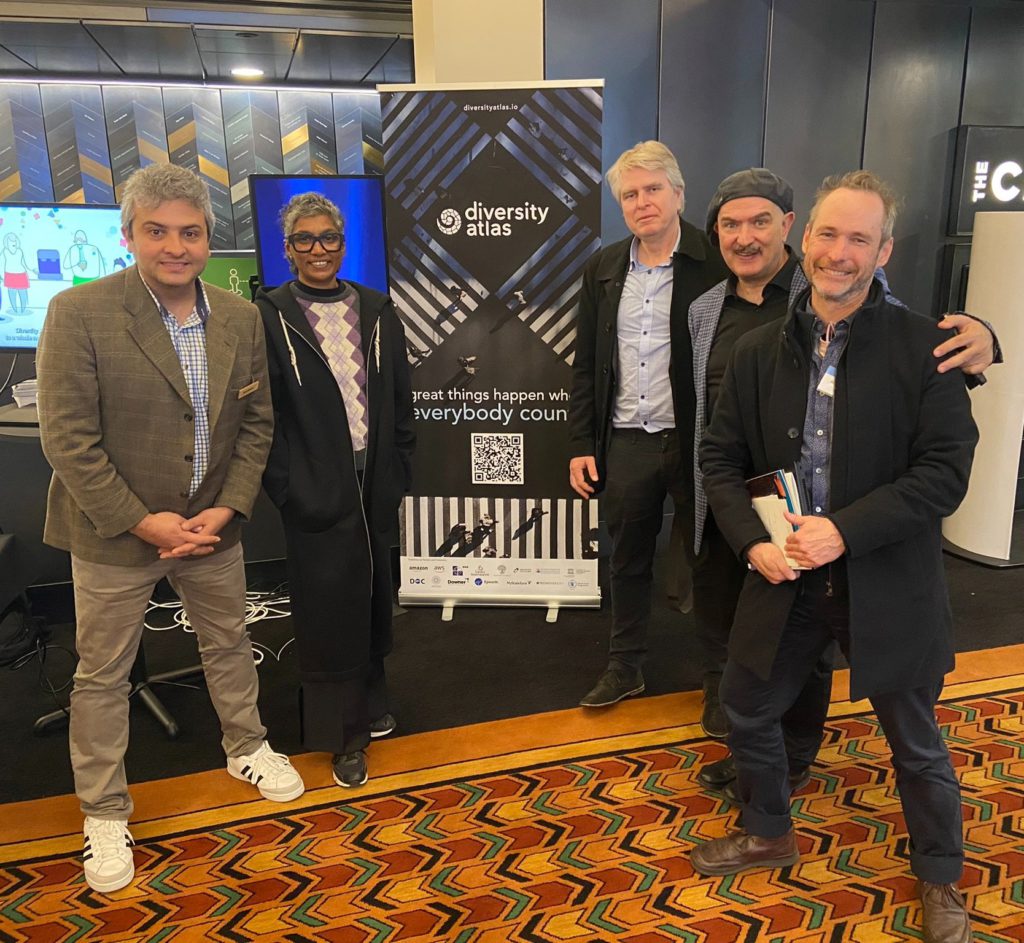
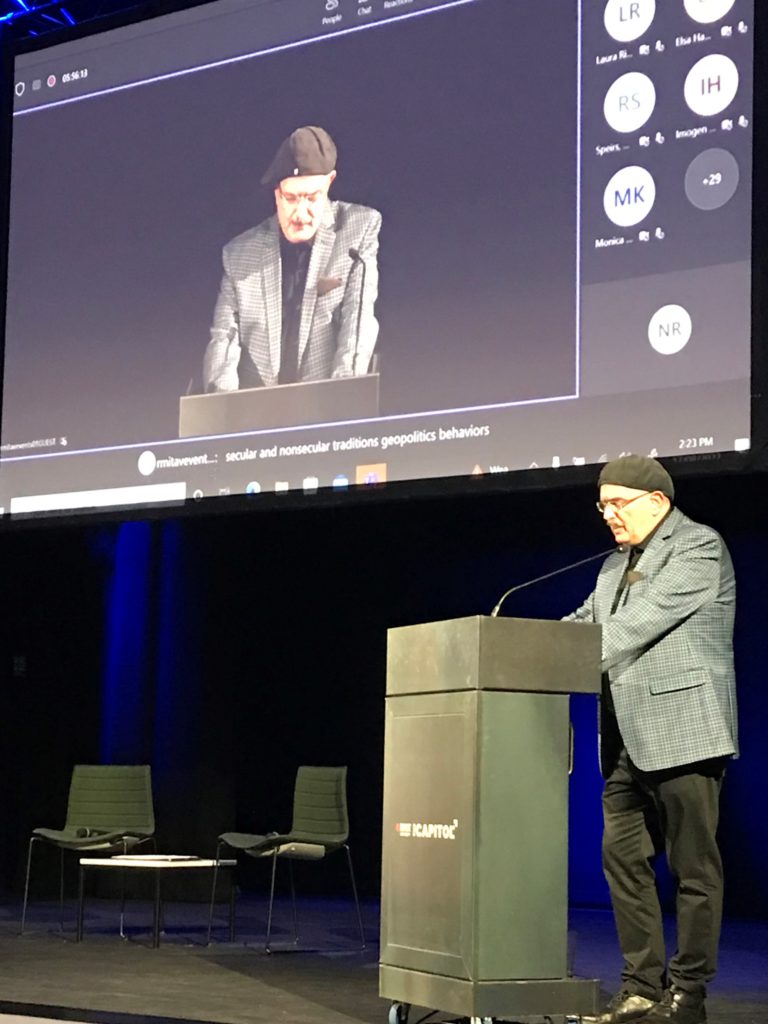
The 2022 Enabling Inclusion and Diversity Summit
Cultural Infusion is a proud gold sponsor of the Equal Employment Opportunity Network (EEON). This month, the committee hosted the 2022 Enabling Inclusion and Diversity Summit, creating a space for organisations from all across Australia to come together in the effort of strengthening all aspects of diversity, equity and inclusion.
This year’s summit showcased a variety of keynotes from top industry leaders of the DEI sector. Each speech covered important topics such as platforming Aboriginal and Torres Strait Islander voices, discussions of equity, anti-racism, menopause, gender-based violence and intersectional approaches to inequality. The President of EEON, Roman Ruzbacky’s heartfelt opening speech is transcribed in the link.
The Diversity Atlas team hosted a booth at the event, to share knowledge, encourage reflection and advocate for diversity in the workplace.
Our CEO and Founder, Peter Mousaferiadis, spoke at the event, discussing how the most effective way to build diverse, equitable and inclusive workplaces is by first analysing and understanding the environment. Peter shares personal stories of his heritage and family to highlight the importance of inclusion and understanding of all cultural backgrounds.
Watch Peter’s speech in the video below.
Eight Simple Diversity Data Exercises
In his newest article, Cultural Infusion’s DEI Director, Roman Ruzbacky, offers eight exercises designed to interpret diversity data while ensuring we do not forget the human behind the figures.
It can be difficult to analyse diversity data. At times we need to look at other influencing factors or work with missing data. How do we convert data or series of data sets into a succinct action? The integrity of the data and its interpretation is critical if we need to get a true picture or come up with appropriate solutions.
Each of the eight case studies provide tips to thoroughly analyse dimensions of diversity in the workplace to improve representation and support for all communities. Roman considers how diverse communities intersect and are represented at each level of the organisation.
He discusses how DEI should be measured over time via longitudinal benchmarks, with an emphasis on awareness in work environments. Roman encourages moving away from a one-size-fits-all strategy through greater personalisation of diversity data, stating that when writing DEI action plans, we must consider a variety of aspects like representation, pay equity and leadership.
Click here to read ‘Eight Simple Diversity Data Exercises‘.

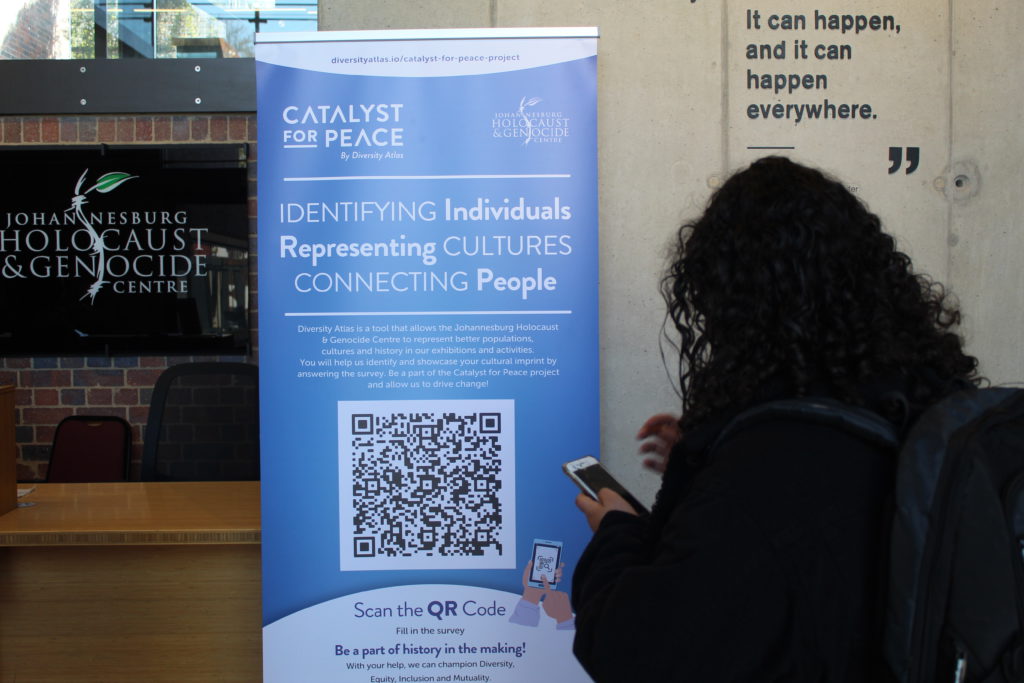
The Catalyst for Peace Project
On behalf of Diversity Atlas, we’d like to congratulate Tali Nates on achieving the 2022 Goethe Medal, and are excited for our collaboration with her on our Catalyst for Peace Project.
The Goethe Medal is an official decoration of the Federal Republic of Germany and is regarded as the most important award for the country’s foreign cultural policy. It honours public figures from around the world who create meaningful change and development for cultural issues and institutions.
Tali is the founder and director of the Johannesburg Holocaust & Genocide Centre, where Diversity Atlas has piloted our Catalyst for Peace Project.
The Catalyst for Peace Project seeks to make sure all audiences and communities are recognised, represented and respected by the cultural centres they visit.
The project has been launched at the centre where audiences can take part in Diversity Atlas by completing a short survey to map the diversity of all attendees. The results reveal the variety of culture in our communities and help us learn more about what makes us who we are.
To find out more about the Catalyst for Peace Project, visit this link.
The Centre for Cultural Diversity in Ageing’s Webinar
Our CEO and Founder, Peter Mousaferiadis, and Chief Technology Officer, Rezza Moieni, spoke at a virtual event for the Centre for Cultural Diversity in Ageing as part of the organisation’s Diversity Webinar Series.
Peter and Rezza introduced the Diversity Atlas platform, showcasing the ability to collect and analyse diversity data within aged care organisations. The Centre for Cultural Diversity in Ageing hosted many DEI leaders, who provided insights into the various ways cultural and diversity data can be used to assist in implementing more inclusive services.
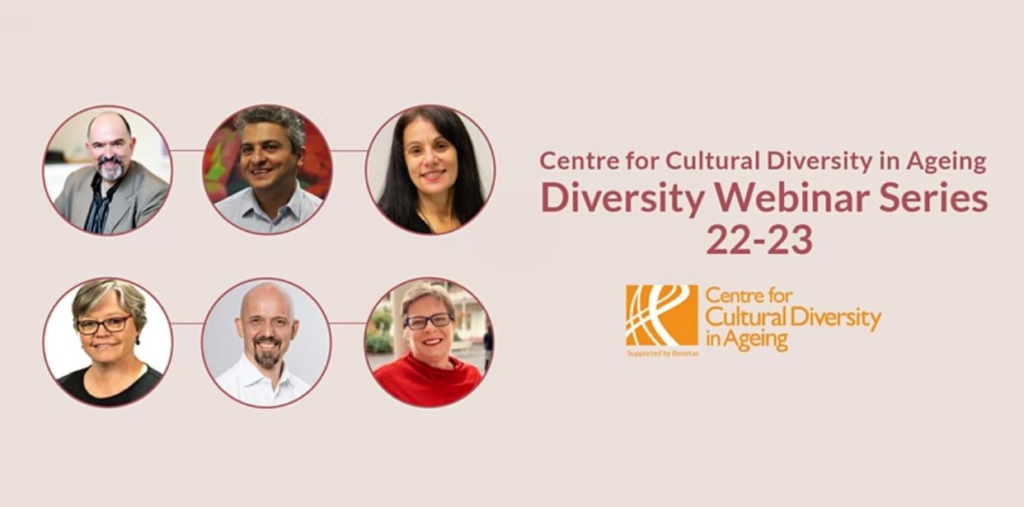
“The webinar was a great opportunity to present our latest achievements with Diversity Atlas, and to meet with so many talented people in the very important area of ageing and cultural diversity. Specifically, we introduced our Mutuality framework and how this minimises the gap between different stakeholders in the aged care sector.”
Rezza Moieni, CTO
New Features and Updates
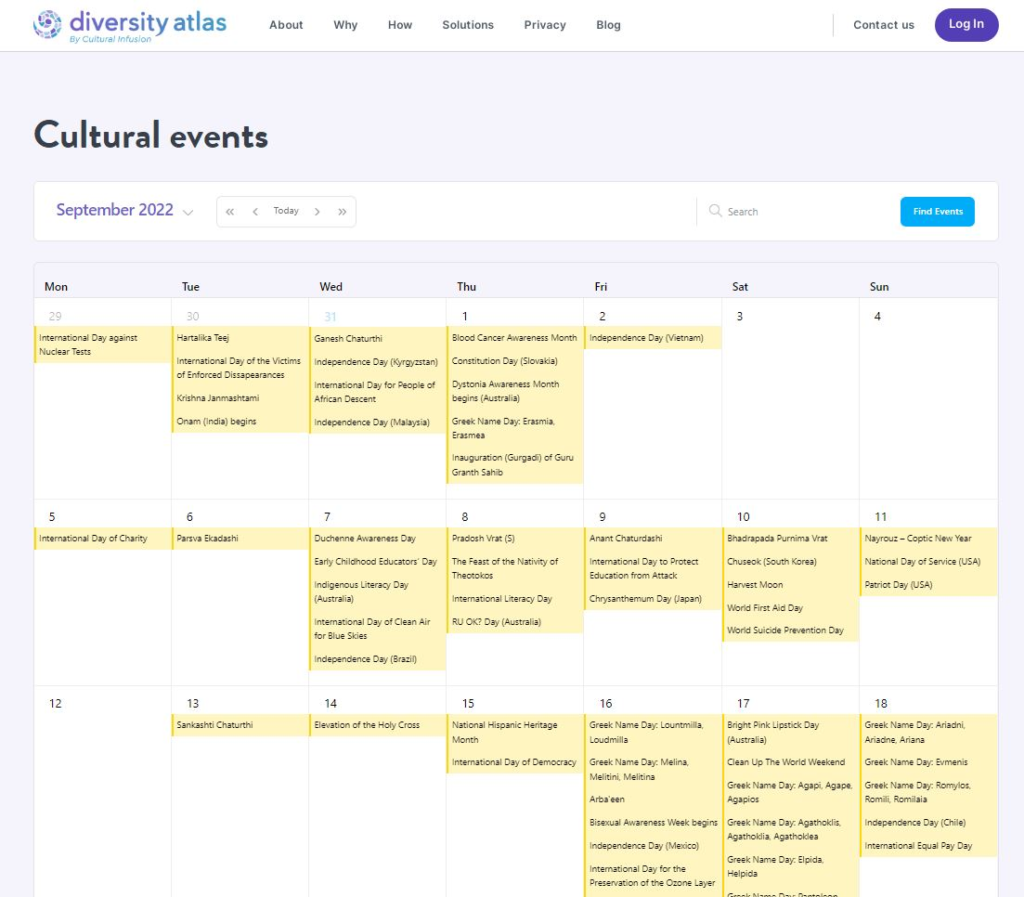
Diveristy Calendar Spotlight
Each newsletter, we put the spotlight on just one of the many thousands of entries in our Diversity Calendar. This month, we’re taking a closer look at Nayrouz, which falls on Sunday 11 September this year.
Nayrouz aka Neyrouz marks the start of the Coptic New Year and has been celebrated by the Coptic Orthodox community on around this date for more than 1700 years.
The Coptic Orthodox Church, based in Egypt and servicing Africa and the Middle East, was established around 42 CE, making it one of the oldest Christian churches in the world. With about 25 million members, it is the largest Christian minority in the Middle East. Coptic music is purely religious, and it is an especially beautiful experience to hear a Coptic children’s choir singing for Nayrouz. There are between 1 and 2 million Copts in the diaspora, most of whom are Coptic Orthodox Christians.
To discover more upcoming cultural celebrations, visit our Diversity Calendar.

In this product update, Diversity Atlas’ Cultural Attaché, Quincy Hall, introduces the two new languages our survey platform is now translated into.
“How Do You Write Jedi Knight in Vietnamese?” – Translation Complexities in Focus.
This month sees some great new features for our survey platform participants, most notably, the availability of two new languages – Greek and Vietnamese, which means we now have 12 languages on offer.
The selection of these two languages in particular came about for a number of reasons. At the very top of the list was taking a fresh look at Australian Census results. Our survey can be taken in languages such as French, Spanish and German, which is great, but we’re an Australian company and we need to take into account not just the global community we both serve and represent, but also our local communities.
Looking at the ‘Top 10’ we see Vietnamese at 4th and Greek at 7th. Meanwhile, both French and German are not in Australia’s Top 10 most spoken languages. We hope one day to have the whole Top 10 available, but there’s a fair bit of work to be done to lay the groundwork.
We do in fact already have ‘Chinese – Simplified’ as an option, but one day we’d like to have definitive Cantonese and Mandarin options. Likewise, Hindi and Arabic are the next two on our wish-list, but as Arabic happens to be a right-to-left written language, we first need to create the architecture for this. Once that happens, Hebrew and Persian will be on their way as well.
And one day … one day in the future … how amazing will it be if we can offer Diversity Atlas in one of the many hundreds of Aboriginal & Torres Strait Islander languages from Australia? For now, it remains an ambition / goal.
It’s not as easy as just translating questions such as ‘What is your country of birth’ and answers like ‘Yes’ or ‘Bachelor Degree’ or ‘Catholic’ into other languages – we have over 45,000 fields to translate, including our almost 9,000-people-group dataset. What is ‘Wurrundjeri’ in Greek? What is ‘Gender Non-Conforming’ in Simplified Chinese? How do you say Syro-Antiochian Maronite Catholic Church in Vietnamese? Well, our translators can answer all of those questions (thankfully) but they have 45,000 fields to keep their eye on.
Note to our customers: NEVER trust Google Translate. If you need something properly translated, go to a translator, or give us a call and we can recommend some people. Google Translate is like Wikipedia in that it is awesome, and handy, and incredibly well run, and a beautiful free gift to the world; but would you really stake your reputation on a product that (for instance) once translated ‘Disability’ into one language as “Has no ability”?
Finally, did the fact that our CEO Peter Mousaferiadis is Greek have any influence on our decision to add Greek? What about our dataset manager My Linh Le being Vietnamese – did that have any bearing on our choice of Vietnamese being added?
Of course not! Total coincidence!
Well … somewhat a coincidence. Heh.
PS: Jedi Knight is Hiệp sĩ Jedi
To read Quincy’s full article, click this link.
Share this Post
